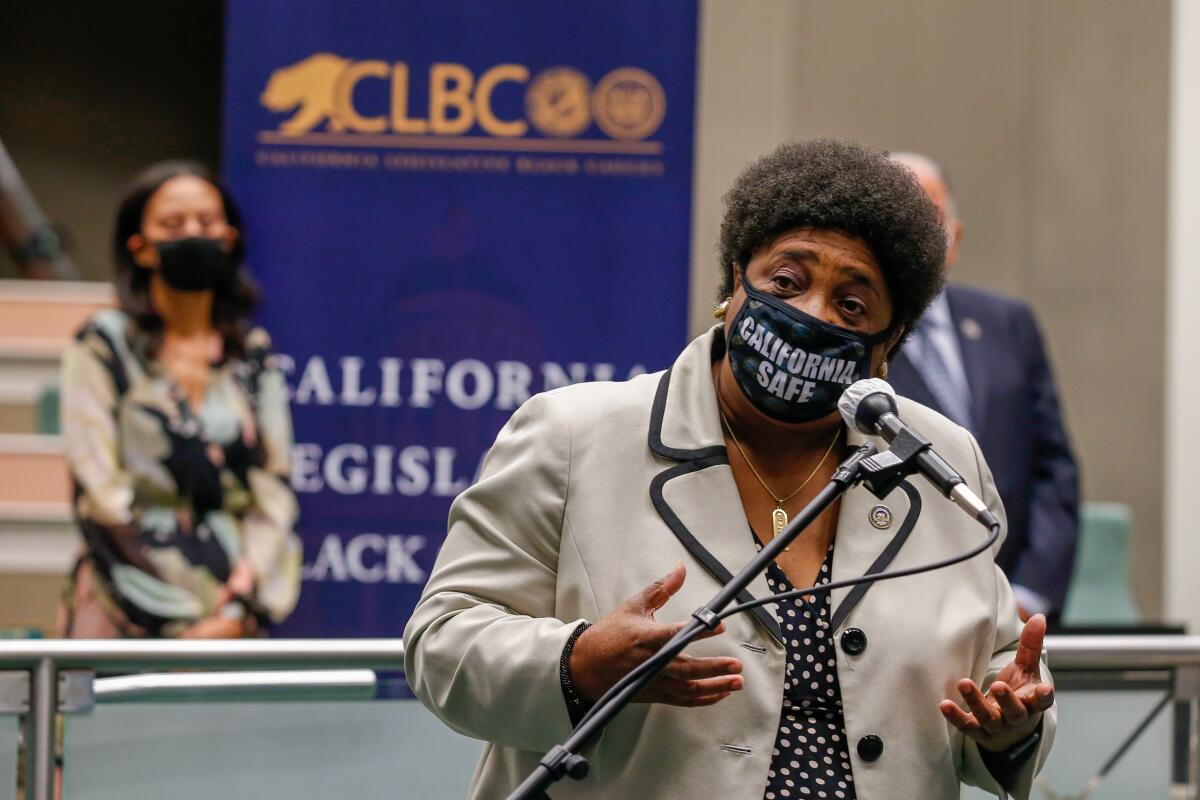California’s slavery reparations task force is convening. Here’s what happens next

- Share via
SACRAMENTO — A historic California task force met for the first time Tuesday with the ultimate goal of recommending reparations for descendants of enslaved people and those affected by slavery.
The state is beginning to consider compensation and other potential remedies after the Legislature and Gov. Gavin Newsom approved a first-of-its-kind law last year that required the study and development of reparations proposals.
“You’re here today not just to sit and answer to say was there harm, but your task is to determine the depth of the harm and the ways in which we are to repair that harm,” Secretary of State Shirley Weber, who introduced the law last year as a state legislator, said to members of the task force on Tuesday. “There has been enough research for the fact that slavery still has an impact today.”
The group is charged with determining what reparations should look like in California and who might be eligible, among other considerations.
“As our country reckons with our painful legacy of racial injustice, California again is poised to lead the way towards a more equitable and inclusive future for all,” Newsom said.
Why was the task force established?
Assembly Bill 3121, which was introduced by Weber, mandated that the state create the “Task Force to Study and Develop Reparation Proposals for African Americans, with a Special Consideration for African Americans Who are Descendants of Persons Enslaved in the United States.”
Weber has said the law, which was signed in 2020, forces California to come to terms with its role in slavery.
Although California entered the Union as a “free state” in 1850, slavery continued here though the state Constitution outlawed it the previous year. Slavery was abolished by the 13th Amendment to the U.S. Constitution in 1865.
The law says state-level reparations should not be seen as a replacement for any future remedies from the federal government.
What will the group do?
The law requires the task force to examine slavery that existed in the United States, discrimination in the public and private sectors against those who were enslaved and their descendants, and the lingering negative effects of the institution of slavery.
The group is required to recommend ways to educate the public on its findings and to recommend remedies.
The law says the task force will recommend how California will issue a formal apology, how to eliminate discrimination in existing state laws and how to establish new programs, policies or projects to address the group’s findings. The task force will also determine how any potential compensation should be calculated and who would be eligible, as well as additional forms of rehabilitation or restitution.
Who is on the task force?
The task force is made up of nine members, with five appointed by the governor, two appointed by the Senate and two by the Assembly.
Newsom’s appointees:
- Cheryl Grills, a clinical psychologist who is director of the Psychology Applied Research Center at Loyola Marymount University. Much of her work focuses on mental health and trauma within the Black community.
- Amos C. Brown, a longtime pastor at the Third Baptist Church of San Francisco and a civil rights leader who studied under the Rev. Martin Luther King Jr. Brown is the vice chair of the reparations task force.
- Lisa Holder, a Los Angeles civil rights litigator with a focus on racial and social justice.
- Donald Tamaki, a lawyer who worked on a historic Supreme Court case involving Fred Korematsu and helped get his charges for refusing incarceration during the internment of Japanese Americans during World War II overturned.
- Jovan S. Lewis, an associate professor of geography at UC Berkeley, who co-leads the Economic Disparities research cluster in Berkeley’s Othering and Belonging Institute. Lewis’ research focuses on racialized poverty.
Assembly appointees:
- Assemblyman Reggie Jones-Sawyer (D-Los Angeles), chair of the Public Safety Committee and Select Committee on the Status of Boys and Men of Color.
- Kamilah Moore, an activist and lawyer who was appointed chair of the task force on Tuesday.
Senate appointees:
- Sen. Steven Bradford (D-Gardena), chair of the California Legislative Black Caucus and chair of the Committee on Public Safety.
- Monica Montgomery Steppe, a San Diego City Council member who has worked as a civil rights lawyer and a criminal justice advocate for ACLU San Diego.
What’s next?
The task force is expected to hold 10 meetings in total over the next two years.
AB 3121 requires the task force to submit a report on its findings and recommendations to the Legislature within one year of its first meeting.
But on Tuesday the task force adopted a recommendation from the attorney general’s office to issue the report in two parts, with the first released next summer and the recommendations for reparations included in a second report published in 2023.
After the report is released, the Legislature would need to pass another bill to approve any reparations.
More to Read
Sign up for Essential California
The most important California stories and recommendations in your inbox every morning.
You may occasionally receive promotional content from the Los Angeles Times.











